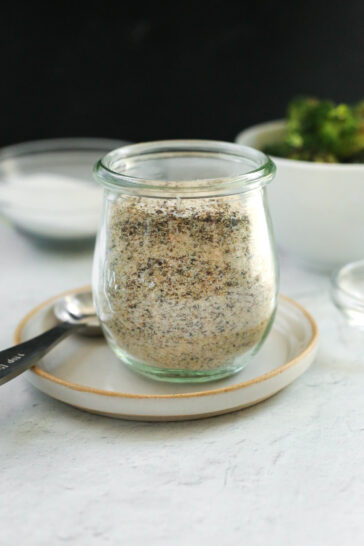Disclosure: This post was created in partnership with Egg Nutrition Center. I was compensated for my time. As always, all opinions are my own.
Imagine coming home from your routine grocery shopping trip. You walk through the door, drop the bags on the counter, and start unloading items to put away in the pantry, fridge or freezer. Now imagine you left half your purchases in the bag and instead of stocking them away, you put that bag in the trash bin to get rolled out to the sidewalk.
It seems crazy wasteful, right?
Well, that’s basically what happens when you only use half your eggs!
In years past, the low fat/no fat diet trends encouraged us to eliminate as much fat as possible from our meals and snacks. Fast forward to present day and high-fat diets have replaced them. As a non-diet dietitian who believes there can be a happy medium, I don’t think we need to swing to such extremes. This all-or-nothing approach isn’t sustainable in more ways than one.
Read on to see why, plus find the recipe for my Sun-Dried Tomato and Kale Frittata!
[Tweet “Learn why this dietitian chooses less waste, more taste when it comes to eggs (#ad)”]
Basics of Egg Nutrition
As a dietitian, it goes without saying that nutrition is important to me. I’m always curious to learn more about food and how it impacts our health, so I thought I’d share a little more on the basics of egg nutrition first. Eggs are a protein powerhouse, that’s no secret. A single large egg provides six grams of protein, nearly half of which is in the yolk! That was a big surprise to me. When I was younger I thought all the protein was in the egg whites so I didn’t hesitate to toss the yolks. Now I know better! The yolk is also where you’ll find important nutrients like Vitamin D, choline, lutein and zeaxanthin.
Did you know eggs are one of the few foods that are a natural source for Vitamin D? One egg provides 6% of the Daily Value of this important nutrient. I’ve struggled with low Vitamin D levels for years so I make sure to include food sources as much as I can, along with enjoying time outdoors and adding a supplement. But I always advocate for food first and eggs are a go-to source for quality nutrition.
But here’s something really special about eggs: they are one of the highest choline-containing foods available to us. Why is choline important? It’s involved in memory, mood, and other functions of the brain and nervous system.
This is especially important for women who are pregnant because it impacts a baby’s brain development. So it’s a really key nutrient, yet the vast majority (about 90%) of Americans don’t eat adequate amounts. Two large eggs are enough to provide about half the recommended amount of choline for pregnant women. And although there are no specific recommendations for how many eggs you can have in a day, having two eggs per day has not been associated with any detrimental health effects.
Don’t Toss the Yolks!
I’m so glad to see we’re moving away from the days of tossing the yolks in the trash or sending them down the garbage disposal. It’s hard knowing how much nutrition is getting wasted! Not only that, but it’s more expensive to eat the whites only because you need more eggs to get the correct volume for a recipe. When I experimented with this Sun-Dried Tomato and Kale Frittata, I ended up using eight whole eggs. Based on the measurements, I estimate I would have needed an entire carton had I used the whites only – and although eggs are usually an affordable ingredient, that hikes up the price and means my grocery budget doesn’t go as far.
The fat and protein from eggs can also help with satiety during meals. I’m big on eating foods that are enjoyable and appetizing, but also provide the nutrition I need to fuel busy days and an active lifestyle. So skipping out on that valuable nutrition just doesn’t make sense for me! I don’t want to be left hungry so including a variety of foods in my meals and snacks, including eggs, makes it easier to prep simple meals that don’t take a lot of time.
Not to mention…that mouthfeel. Eating full-fat foods just tastes better to me. It’s OK if you genuinely prefer the taste or texture of egg whites but generally speaking, using the yolks in cooking creates a much, MUCH tastier final dish.
I’ve also had the fortunate experience of being able to meet some of the farmers and ranchers who produce our food. It’s been so enlightening (and inspiring!) to hear their stories and learn how they manage their farms and treat their animals. They put in so much care and concern to produce high-quality, safe foods. It just seems like a huge disservice to them to waste such a significant amount of the end result of all their hard work.
Sun-Dried Tomato and Kale Frittata
Now for my favorite part: where all our nutrition and culinary knowledge comes together to create a delicious recipe! I was inspired by the flavors of late summer that can carry into fall. Although there aren’t as many vine-ripe tomatoes around, the sun-dried version brings a different kind of tomato flavor to this recipe. I opted for the type that isn’t packed in oil, as having that in the recipe plus the fat from the egg yolks would create a very dense texture.
Another trick for a fluffy frittata is to only whisk the eggs until the yolks are broken and combined with the egg whites. Over-beating your eggs can be a good stress reliever but it doesn’t make for an appealing texture in your finished recipe! I also like to add whole milk to my egg mixture but that can be easily omitted or swapped for your favorite non-dairy milk alternative.
Check out one of my other favorite breakfast recipes: Chimichurri Potato Breakfast Tacos with Eggs!
Check out the full recipe for my Sun-Dried Tomato and Kale Frittata below. It could be a tasty addition to your breakfast or brunch routine. The leftovers can be stored for packed lunches or easy weeknight dinners so you better believe I baked up enough to enjoy this recipe all week!

Sun-Dried Tomato & Kale Frittata
Ingredients
- 1/2 red onion, diced
- 2 packed cups roughly chopped kale
- 1/2 tbsp olive oil
- 1/4 cup sun-dried tomatoes, chopped
- Fine sea salt and pepper to taste
- 8 large eggs
- 1/4 cup whole milk
- 1/4 cup goat cheese crumbles
Instructions
- Heat oven to 350 degrees F.
- Heat the olive oil in a cast iron or oven-safe skillet over medium-high heat. Once oil is heated, add the diced onions and kale. Season with salt and pepper to taste, then allow to cook until kale reduces in volume and onions become translucent (about 5 minutes).
- In the meantime, crack the eggs into a mixing bowl and add the milk. Gently whisk until combined.
- Add the sun-dried tomatoes to the kale mixture and stir to combine. Spread evenly in the skillet, then pour the prepared egg mixture over the top. Gently shake the skillet to evenly distribute the egg mixture. Top with additional sun-dried tomatoes (optional) and goat cheese. Do not stir.
- Allow to cook on the stovetop for 2-3 minutes or until edges are set. Transfer the skillet to the middle rack of your preheated oven and allow to cook 12-15 minutes more or until the center is set and edges begin to pull away from the sides of the skillet.
- Allow to cook slightly before slicing into six even wedges and serving. If storing leftovers, allow to cool before sealing and chilling in the refrigerator.
Nutrition
If you don’t have an oven-safe skillet, try preparing this easy frittata as a baked dish instead. Transfer the mixture to your non-stick or oiled bakeware instead of cooking on the stovetop and adjust the baking time to allow the center to fully set. A frittata is really just a quiche without the crust, so if you’re feeling like quiche, you can also use this recipe for that!
How do you like your eggs? Have you changed how you prepare them as food trends start to shift?
[Tweet “(#ad) This Sun-Dried Tomato Frittata belongs on your brunch menu! Check it out, along with fun facts about egg nutrition”]
Eggs aren’t just for breakfast! Dinner eggs are one of my favorite foods trends so be sure to check out simple, savory egg recipes like this Easy Homemade Ramen Bowl.



















Questions & Reviews
Looks scrumptious!
Great Content, I also write about EGG NUTRITION FACTS you can read from here https://delicativelife.com/just-egg-nutrition-facts/